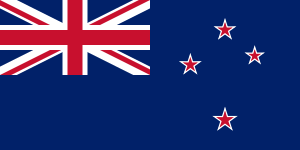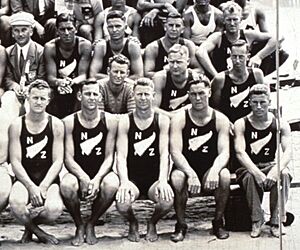New Zealand at the Olympics facts for kids
Quick facts for kids New Zealand at theOlympics |
|||||||||
|---|---|---|---|---|---|---|---|---|---|
 |
|||||||||
| IOC code | NZL | ||||||||
| NOC | New Zealand Olympic Committee | ||||||||
| Medals Ranked 25th |
|
||||||||
| Summer appearances | |||||||||
|
|||||||||
| Winter appearances | |||||||||
|
|||||||||
| Other related appearances | |||||||||
New Zealand first sent its own team to the Olympic Games in 1920. Before that, in 1908 and 1912 Summer Olympics, New Zealand athletes competed with Australian athletes as part of a combined team called Australasia. New Zealand has also taken part in most Winter Olympic Games since 1952, only missing the 1956 and 1964 Games.
The New Zealand Olympic Committee (NZOC) is the group in charge of the Olympics for New Zealand. It was started in 1911 and officially recognised by the IOC in 1919.
New Zealand athletes have won a total of 163 medals at the Olympics. Most of these, 157, were won at the Summer Games, and six at the Winter Games. The sport where New Zealand has won the most medals is rowing, with 33 medals. Athletics is second with 28 medals. Before the 2022 Winter Olympics, New Zealand was ranked 32nd in the world for the total number of medals won.
After the 2020 Summer Olympics, 1519 athletes had represented New Zealand at the Games. Harry Kerr is known as the first ever New Zealand Olympian. Adrian Blincoe was the 1000th.
Contents
New Zealand at the Summer Olympics
The very first person from New Zealand to compete at the Olympics was Victor Lindberg. He was part of a British water polo team that won a gold medal in 1900.
Three New Zealanders won medals while competing for the Australasian team in 1908 and 1912. New Zealand sent its first independent team to the 1920 Olympics. This team had two runners, a rower, and a 15-year-old swimmer.
Because New Zealand is far away in the South Pacific, athletes used to have long sea journeys to get to the early Olympic host cities in Europe and North America. Since international jet travel became common in the 1950s, and with more sports in the Olympics, the size of New Zealand's Olympic teams has grown a lot.
New Zealand, like other countries in the Southern Hemisphere, faces a challenge. Their summer sports happen during their winter months. This means athletes have to train to be at their best when it's cold in New Zealand. Only three Olympics have been held in the Southern Hemisphere: Melbourne (1956), Sydney (2000), and Rio de Janeiro (2016).
New Zealand's participation in the 1976 Games caused some debate. Many African countries decided not to compete. They were protesting against sports teams from New Zealand, like the All Blacks rugby team, playing against apartheid South Africa.
New Zealand at the Winter Olympics
New Zealand has had fewer athletes at the Winter Olympics. This is because New Zealand has an oceanic climate, and its location in the Southern Hemisphere means winter sports happen during the New Zealand summer. Athletes need to be at their peak performance during this time.
The country didn't send its first Winter Olympic team until 1952. In 1988, the team included bobsleighers. This was the first time New Zealand competed in a winter sport other than alpine skiing.
In 1992, Annelise Coberger from New Zealand made history. She became the first person from the Southern Hemisphere to win a medal at the Winter Olympics. She won a silver medal in slalom skiing at Albertville in France.
In 2018, Zoi Sadowski-Synnott won New Zealand's second Winter Olympic medal. She earned a bronze in the new big air snowboarding event in Pyeongchang, South Korea. On the same day, 16-year-old Nico Porteous won New Zealand's third Winter Olympic medal. He took bronze in the men's ski halfpipe.
Four years later, in 2022, Zoi Sadowski-Synnott achieved another first. She won New Zealand's first-ever Winter Olympics gold medal in the women's slopestyle. Nico Porteous then won New Zealand’s second gold medal, again in the men’s ski halfpipe.
Athlete Selection and Sport Funding
Athletes are chosen by national sports groups and then suggested to the NZOC for the Olympic team. The way athletes were chosen was changed after the 2000 Summer Olympics in Sydney, Australia. At those Games, 151 New Zealand athletes won only four medals (one gold and three bronze).
The NZOC then created new rules. An athlete would only be chosen if they had a good chance to finish in the top 16 in their Olympic event. This also led to big changes in how high-performance sports are funded. A group called Sport and Recreation New Zealand (SPARC) was set up. They changed from giving money in big chunks to focusing support on specific sports and athletes. This also meant some sports groups had to join together, as SPARC would only work with one main funding body for each sport.
Medals by Sport
Medals by Summer Sport
Leading in that sport
| Sport | Gold | Silver | Bronze | Total |
|---|---|---|---|---|
| Rowing | 15 | 7 | 11 | 33 |
| Canoeing | 14 | 3 | 2 | 19 |
| Athletics | 11 | 4 | 13 | 28 |
| Sailing | 9 | 9 | 7 | 25 |
| Cycling | 3 | 7 | 5 | 15 |
| Equestrian | 3 | 2 | 5 | 10 |
| Rugby sevens | 2 | 2 | 0 | 4 |
| Swimming | 2 | 1 | 3 | 6 |
| Triathlon | 1 | 2 | 2 | 5 |
| Boxing | 1 | 1 | 2 | 4 |
| Golf | 1 | 1 | 1 | 3 |
| Field hockey | 1 | 0 | 0 | 1 |
| Shooting | 0 | 1 | 1 | 2 |
| Gymnastics | 0 | 0 | 1 | 1 |
| Tennis | 0 | 0 | 1 | 1 |
| Totals (15 entries) | 63 | 40 | 54 | 157 |
Medals by Winter Sport
| Sport | Gold | Silver | Bronze | Total |
|---|---|---|---|---|
| Snowboarding | 1 | 1 | 1 | 3 |
| Freestyle skiing | 1 | 0 | 1 | 2 |
| Alpine skiing | 0 | 1 | 0 | 1 |
| Totals (3 entries) | 2 | 2 | 2 | 6 |
See also
 In Spanish: Nueva Zelanda en los Juegos Olímpicos para niños
In Spanish: Nueva Zelanda en los Juegos Olímpicos para niños
- List of flag bearers for New Zealand at the Olympics
- List of New Zealand Olympic medallists
- Category:Olympic competitors for New Zealand
- New Zealand Olympic Committee
- New Zealand at the Paralympics
 | Emma Amos |
 | Edward Mitchell Bannister |
 | Larry D. Alexander |
 | Ernie Barnes |


